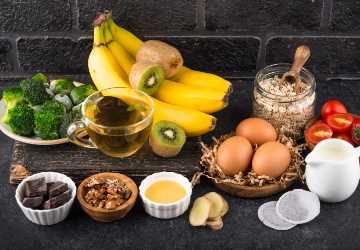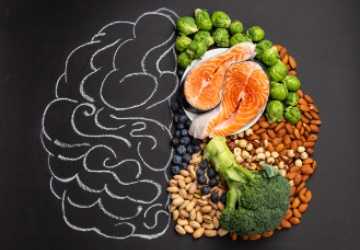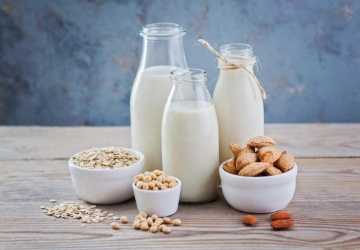Impact of Diet on Mental Health
Have you ever noticed how a delicious meal can instantly lift your spirits? Or how does reaching for comfort food during stressful times feel almost instinctive? The food we consume has a huge impact on our mental well-being and physical health.
Have you ever noticed how a delicious meal can instantly lift your spirits? Or how does reaching for comfort food during stressful times feel almost instinctive? The food we consume has a huge impact on our mental well-being and physical health.
Welcome to exploring the profound and often overlooked connection between diet and mental health. Grab a healthy snack, and let’s spread mental health awareness by learning about the connection between mental health and diet and how the food on our plate can be a key ingredient in maintaining a healthy mind.
Food as Fuel for the Mind: Nutrients and Neurotransmitters
Our brains are like complex computers, constantly firing signals and processing information. But just like any computer, they need the right fuel (which comes from the food we intake) to function at their best. Certain nutrients play a starring role in influencing our mental well-being.
Neurotransmitter Powerhouse: Foods and Brain Chemicals
Imagine tiny messengers zipping around your brain, influencing your mood, sleep, and focus. These are neurotransmitters, and guess what? Certain dietary choices can directly impact their production!
1. Happy Helpers
Foods rich in B vitamins, like leafy greens and whole grains, are essential for the production of serotonin, a neurotransmitter associated with happiness, relaxation, and good sleep.
2. Focus Fuel
Feeling foggy-brained? Omega-3 fatty acids, found in fatty fish and nuts, can support the production of dopamine, a neurotransmitter that plays a key role in focus, motivation, and learning.
Building Blocks for a Healthy Mind: Essential Vitamins and Minerals
Beyond neurotransmitters, a symphony of essential vitamins and minerals keeps our brains functioning optimally. Here are some key players:
3. Brainpower Booster
Iron is crucial for carrying oxygen to the brain, which is essential for cognitive function and energy levels. Lean meat, beans, and leafy greens are all iron-rich options.
4. Memory Marvel
Studies suggest that B12 may play a role in memory function. Deficiency can be linked to fatigue and brain fog. Look for B12 in animal products or fortified foods.
The Deficiency-Mental Health Connection: A Nuance

It's important to note that the link between nutrient deficiencies and mental health challenges can be complex. While deficiencies can contribute to symptoms, they may not be the sole cause. Always seek professional assistance and personalized advice on managing any suspected deficiencies.
Beyond the Basics: Food and Specific Mental Health Conditions
While diet isn't a magic bullet for mental health challenges, research suggests it can be a powerful tool for managing symptoms alongside traditional therapies. Let's explore some connections:
1. Anxiety and Food: Finding Calm on Your Plate
Certain foods may influence anxiety symptoms. For example, limiting processed foods, caffeine, and refined sugars may help some people manage anxiety, as these can contribute to feelings of jitters and instability. Incorporating calming options like chamomile tea or foods rich in magnesium (think dark leafy greens and nuts) might be beneficial for some.
2. Depression and Diet: Nourishing Your Mood
Studies suggest a link between a healthy diet rich in fruits, vegetables, and whole grains and reduced symptoms of depression. These foods provide essential nutrients for neurotransmitter production and overall brain health. However, dietary changes alone may not be enough since depression is a challenging mental illness.
3. ADHD and Food Choices: Supporting Focus
While there's no one-size-fits-all approach, some research suggests that children with ADHD may benefit from a diet that limits processed foods, artificial colors, and refined sugars. These can potentially exacerbate hyperactivity and inattentiveness. Focusing on protein-rich options and healthy fats may help with focus and energy levels.
Making Smart Food Choices for Mental Wellness – Mental Health and Diet
Now that we've explored the fascinating relationship between diet and mental health, let's translate this knowledge into practical tips for your everyday meals:
Brain-Boosting Bites: Fueling Your Mood with Food
· Rainbow on Your Plate: Aim for variety colorful fruits and vegetables. They're packed with antioxidants and essential vitamins that nourish your brain.
· Go Nuts for Nuts & Seeds: These tiny powerhouses are rich in healthy fats, protein, and B vitamins, all crucial for brain function. Add them to salads or yogurt, or enjoy them as a healthy snack.
· Fatty Fish Fiesta: Salmon, tuna, and sardines are superstars regarding brain health. Aim for 2-3 servings per week to reap the benefits of omega-3 fatty acids.
· Don't Forget the Fermented Friends: Fermented foods like yogurt, kimchi, and kombucha are teeming with bacteria that benefit the gut, which, as we know, can have a positive impact on mental well-being.
Why Limit Processed Foods and Added Sugars?
While occasional treats are okay, processed foods and sugars may negatively impact your mood and cognitive function. Here's why:
· Sugar Crash Blues: The initial sugar rush from processed foods is often followed by a crash, leading to fatigue and difficulty concentrating.
· Nutrient Void: Processed foods are often low in the essential nutrients your brain craves, leaving you feeling sluggish and unfocused.
Mindful Munching: Savor the Journey
In our fast-paced world, it's easy to eat while scrolling through our phones mindlessly. But mindful eating practices can be a powerful tool for mental well-being:
· Slow Down and Savor: Take the time to appreciate and explore the texture, taste, and aroma of your food. Chew thoroughly and pay attention to your body's hunger and fullness cues.
· Reduce Distractions: Put away your phone and create a calm environment for your meals. This allows you to focus on the act of eating and enjoy the experience.
Mental Health Awareness – Your Food Choices, Your Mental Health

You are what you eat, which also applies to your mental health. By putting in the effort to choose wisely when it comes to food, you can actively nourish your mind and your body. Don't be afraid to experiment with new brain-healthy recipes and discover the delicious path to mental wellness.
The world of diet and mental health is a vast and ever-evolving landscape. There's always more to learn! If you want to explore further, consider consulting a nutritionist or mental health professional for personalized advice. Remember, a healthy mind and body go hand-in-hand, and the food on your plate can be a powerful tool in achieving both.





